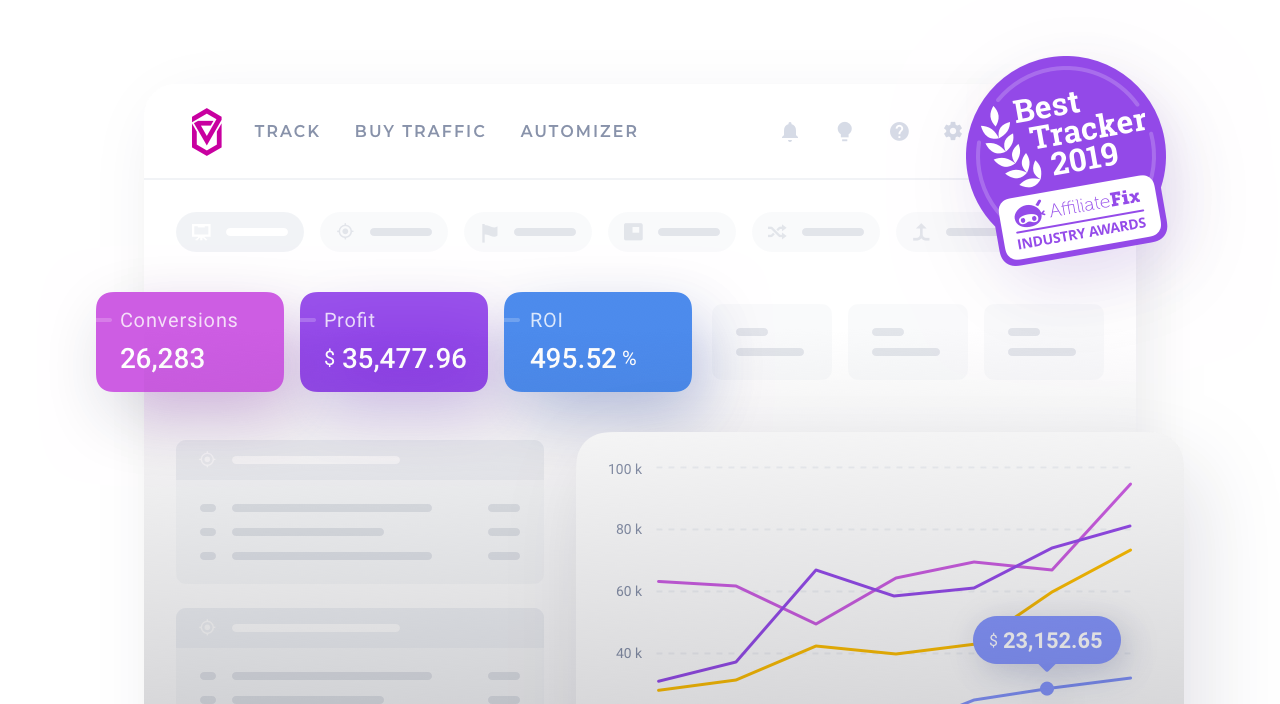Pass Information from a Traffic Source to Voluum
When a visitor clicks an advertisement, a lot of information can be carried along about visit characteristics. Traffic sources can send a certain predefined set of information using HTTP(S) requests. Voluum captures this information and adds additional ones, derived from visitor's
To learn more about how information is passed in general, read the How Information is Passed article.
How It Works
While adding a traffic source element in Voluum, in the Advanced parameters section, you need to map parameters that your traffic source sends with Voluum variables.
Voluum Note: If you add a traffic source from a template, parameters are already matched and you do not need to adjust any settings in the traffic source's setup.
Let's consider a situation, where you want to pass information about which creative has been clicked by the visitor from your traffic source platform to Voluum. You need to refer to your traffic source's documentation to know which parameter it uses to pass information about a creative.
In the example below, information about creative is defined by the creative_id traffic source's parameter name and passed in the {creative_id} token. This name and {token} pair is mapped to the Voluum var1 custom variable.

From now on, Voluum's var1 custom variable will be associated with the information about a creative.
Parameters you have configured will be automatically appended to the campaign URL. Your campaign URL in this case would look like this:
https://your_voluum_domain.com/campaign_id?clickid={clickid}&cost={cost}&creative_id={creative_id}When a visitor clicks an advertisement, tokens will be replaced with actual values that characterize this person's visit. See the example campaign URL after a visitor's click:
https://your_voluum_domain.com/25ee1413-ed3d-4b6b-86e9-7e2b07c9d655?clickid=c384EFV6JHQODRN70575OK6U&cost=1&creative_id=my_attractive_creativeVoluum Note: Note that both parameter names and tokens are case-sensitive.
Custom Variables in Reports
Custom variables that you match with traffic source parameters will be visible in reports, along with other information derived by Voluum from the user agent of a visitor. You can group your reports based on this variable, as shown on the image below:

Read the Reports: Overview article to learn more about reporting options in Voluum.
Setting up Advanced Parameters
Matching traffic source platform parameters with custom variables can be done in the traffic source element setup in Voluum, in the Advanced parameters section. The table below shows what kinf of information you need to provide:
|
Name: |
Parameter |
Token |
Track (On/off) |
|---|---|---|---|
|
This field is used for naming your variable reports. Even when you use the traffic source template with the predefined names, you can modify them and adjust to your needs. Those names will be displayed in Voluum's reports. |
This is entered into your campaign URL and is directly related to a corresponding token. |
This is the token you receive from your traffic source and is used to relay specific data variables. |
This defines whether the variable is tracked and included in your reports. |
|
External ID: Use this parameter to track external unique IDs, assigned by the traffic source platform. This option is (typically) used when you need to pass information back the traffic source platform for conversion tracking purposes. This external ID will be then recognized by the traffic source and matched with the original visit. You can add up to three external IDs, if your traffic source supports it. |
Example: cid |
Example: {transaction_id} |
If only supported by the traffic source, always available. |
|
Cost: You should only add this parameter/placeholder if your traffic source can dynamically record costs. This will enable you to automatically track costs using the Auto setting in the campaign setup. |
Example: cost |
Example: {cost} |
If only supported by the traffic source, always available. |
|
Custom variable: Most traffic sources let you pass extra arguments in the destination URL, such as publisher ID, target ID or keyword. If included, Voluum can track these dynamic parameters and generate additional report insights. |
Example: placement |
Example: {placement} |
Available only if a toggle is turned on. |
Frequently Asked Questions
Have more questions? You might find answers below:
What is Click ID?
Click ID is a unique identifier that is assigned to each click and is used to track the user's journey through the campaign. In campaigns with Lander&Offer funnel the Click ID is generated while visitor clicks on Lander CTA buttom with Click URL under it. In Offer only campaign funnel, the Click ID is generated while the Campaign URL is activated.
What is CEP?
CEP is metadata that keeps information needed for tracking, successful redirections, and also for performing our internal mechanisms; this data includes e.g. campaign ID, lander IDs, offer IDs, visit time, and many more. The CEP parameter is generated when a visitor enters the campaign funnel, and it is attached to the lander element (it's also stored in a cookie for 24 hours). Thanks to that when the visitor goes through the click URL Voluum 'knows' to which offer the visitor should be redirected.


